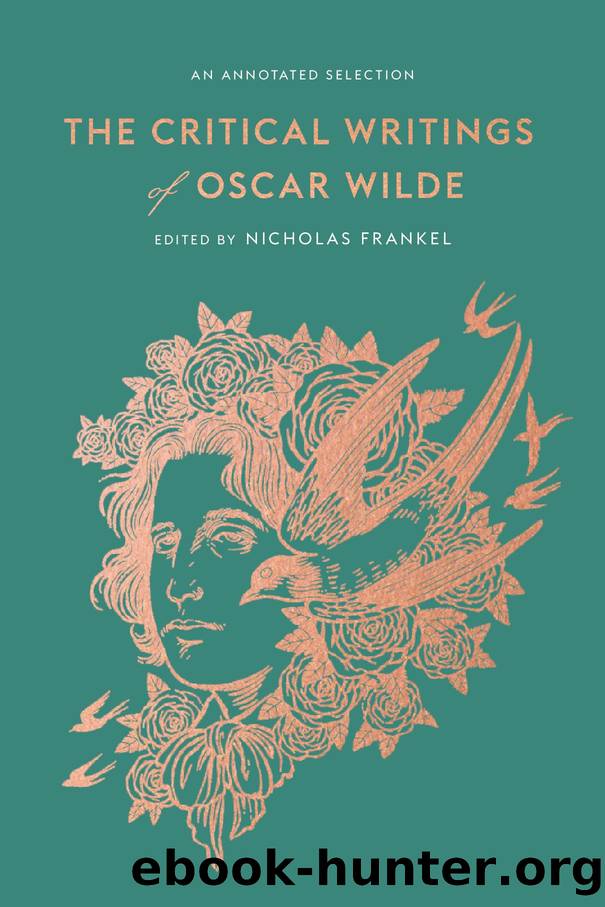The Critical Writings of Oscar Wilde by Oscar Wilde

Author:Oscar Wilde
Language: eng
Format: epub
Publisher: Harvard University Press
Cyril. You have proved it to my dissatisfaction, which is better. But even admitting this strange imitative instinct in Life and Nature,129 surely you would acknowledge that Art expresses the temper of its age, the spirit of its time, the moral and social conditions that surround it, and under whose influence it is produced.
Vivian. Certainly not! Art never expresses anything but itself. This is the principle of my new aesthetics; and it is this, more than that vital connection between form and substance, on which Mr. Pater dwells, that makes music the type of all the arts.130 Of course, nations and individuals, with that healthy natural vanity which is the secret of life, are always under the impression that it is of them that the Muses are talking, always trying to find in the calm dignity of imaginative art some mirror of their own turbid passions, always forgetting that the singer of life is not Apollo, but Marsyas.131 Remote from reality, and with her eyes turned away from the shadows of the cave,132 Art reveals her own perfection, and the wondering crowd that watches the opening of the marvellous, many-petalled rose fancies that it is its own history that is being told to it, its own spirit that is finding expression in a new form. But it is not so. The highest art rejects the burden of the human spirit, and gains more from a new medium or a fresh material than she does from any enthusiasm for art, or from any lofty passion, or from any great awakening of the human consciousness. She develops purely on her own lines. She is not symbolic of any age. It is the ages that are her symbols.
Even those who hold that Art is representative of time and place and people, cannot help admitting that the more imitative an art is, the less it represents to us the spirit of its age. The evil faces of the Roman emperors look out at us from the foul porphyry and spotted jasper in which the realistic artists of the day delighted to work, and we fancy that in those cruel lips and heavy sensual jaws we can find the secret of the ruin of the Empire. But it was not so. The vices of Tiberius could not destroy that supreme civilization, any more than the virtues of the Antonines could save it.133 It fell for other, for less interesting reasons. The sibyls and prophets of the Sistine may indeed serve to interpret for some that new birth of the emancipated spirit that we call the Renaissance;134 but what do the drunken boors and brawling peasants of Dutch art tell us about the great soul of Holland? The more abstract, the more ideal an art is, the more it reveals to us the temper of its age. If we wish to understand a nation by means of its art, let us look at its architecture or its music.
Cyril. I quite agree with you there. The spirit
Download
This site does not store any files on its server. We only index and link to content provided by other sites. Please contact the content providers to delete copyright contents if any and email us, we'll remove relevant links or contents immediately.
Kathy Andrews Collection by Kathy Andrews(11831)
The remains of the day by Kazuo Ishiguro(8998)
Spare by Prince Harry The Duke of Sussex(5195)
Paper Towns by Green John(5189)
The Body: A Guide for Occupants by Bill Bryson(5096)
Industrial Automation from Scratch: A hands-on guide to using sensors, actuators, PLCs, HMIs, and SCADA to automate industrial processes by Olushola Akande(5061)
Machine Learning at Scale with H2O by Gregory Keys | David Whiting(4313)
Be in a Treehouse by Pete Nelson(4051)
Never by Ken Follett(3954)
Harry Potter and the Goblet Of Fire by J.K. Rowling(3856)
Goodbye Paradise(3810)
The Remains of the Day by Kazuo Ishiguro(3412)
Into Thin Air by Jon Krakauer(3398)
Fairy Tale by Stephen King(3394)
The Cellar by Natasha Preston(3344)
The Genius of Japanese Carpentry by Azby Brown(3309)
120 Days of Sodom by Marquis de Sade(3273)
Reminders of Him: A Novel by Colleen Hoover(3116)
Drawing Shortcuts: Developing Quick Drawing Skills Using Today's Technology by Leggitt Jim(3080)
